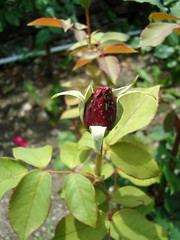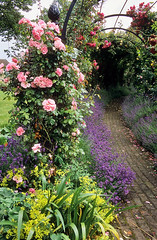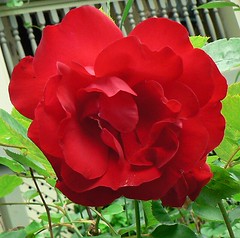1. Black Spots on Leaves
| Black Spot on rose leaves. (Photo credit: Wikipedia) |
2. Stunted or malformed young canes
Known as powdery mildew, this is a fungal disease that covers leaves, stems and buds with wind spread white powder. It makes the leaves curl and turn purple. Spray with an organic fungicide to treat this fungal disease, and as mentioned in Tuesday's post, try to surround your roses with other kinds of plants instead of planting them close together with other roses, to prevent the spread of the disease.
3. Blistered underside of leaves
Known as rust, this disease is characterized by orange-red blisters that turn black in fall. It can survive the winter and will then attack new sprouts in the spring. Collect and discard leaves that are infected in fall. An organic fungicide spray may help if necessary.
4. Malformed or stunted leaves and flowers
This is caused by spider mites. They are tiny yellow, red or green spiders found on the underside of leaves where they suck juices. Ladybugs or an application of organic insecticide may help.
| Aphids on rose (Photo credit: Scot Nelson) |
This is caused by aphids. They are small soft-bodied insects that usually brown, green or red. Often clustered under leaves and flower buds, they suck plant juices from tender buds. Get some ladybugs for your garden - they feed on aphids and can help keep them under control on your rose bushes.
6. Flowers that don't open or are deformed when they open.
Thrips could be the reason behind this problem. They are slender, brown-yellow bugs with fringed wings that also suck juices from flower buds. Cut and discard the infested flowers. Organic insecticidal soaps can sometimes help if the infestation is severe.
Remember that roses are hungry feeders that require much organic fertilizer to become healthy bushes. By keeping your roses healthy and strong, you can help them avoid or combat many common diseases and pests without having to resort to chemical methods at all.
Organic Rose Fungicides & More:












